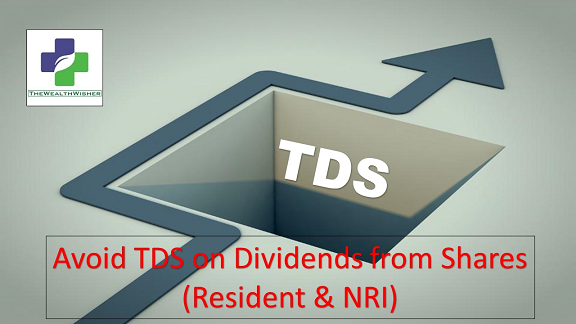As you may be aware & we also wrote in detail a few days ago, due to changes introduced by the Finance Act, 2020, w.e.f. April 1, 2020, the dividend is taxable in the hand of the investor. Hence companies would be required to deduct tax at source (TDS) at the prescribed rates from the dividend paid to shareholders. Is there a possibility of Avoiding TDS on Dividend from Shares? Yes, there is – Here is the Process & Documents required to Save TDS on dividends for Resident Investors & NRI Investors both.
This article will cover:
- What is the Tax Rate of Tax Deducted at Source (TDS) under various categories, when dividend is declared in Equity Shares?
- How Resident can Avoid TDS on Dividends declared by Shares or Stocks. Download the form 15G or Form 15H to avoid TDS.
- The process & documents by which NRIs can reduce or eliminate TDS on Dividends declared by Shares. You can also download formats of Form 10F & Self Declaration for NRIs.
The companies will deduct TDS at the time of making payment of the dividend.
The TDS rate would vary depending on the residential status of the shareholder and the documents submitted by them.
Avoiding TDS on Dividend For Resident Shareholder
In the case of resident shareholders, Section 194 of the Income Tax Act, 1961 (I-T Act) provides a mandate for withholding tax @ 10% on dividend income.
In the absence of Permanent Account Number (PAN), the TDS rate of 20% will apply.
Reduced Rate of TDS for Residents from 14 May 2020 to 31 March 2021
The Central Board of Direct Taxes issued a Press Release dated May 13, 2020, stating that TDS rates on the amount paid or credited to residents during the period from May 14, 2020, to March 31, 2021, has been reduced by 25%.
Thus, in the case of resident shareholders, withholding tax @ 7.5% (instead of 10%) on dividend income shall apply under Section 194 of the I-T Act.
It is also clarified that there shall be no reduction in rates of TDS, where the tax is required to be deducted at a higher rate due to non-furnishing of PAN.
TDS shall be deducted on the dividend payable to a resident individual if the total dividend to be received by them during FY does not exceed Rs. 5000/-.
Avoid TDS by Filing Form 15G/15H: In cases where the shareholder provides a declaration in Form No. 15G (applicable to any person other than a Company or a Firm)/ Form No. 15H (applicable to an Individual above the age of 60 years), TDS will not be deducted provided the eligibility conditions are met. (Download Form 15G & Forms 15H in PDF WORD & EXCEL in Editible Format)
Avoiding TDS on Dividend For Non-Resident Shareholder
Under the provisions of Section 195 of the I-T Act, taxes will be withheld at the rates in force.
Tax Rate
As per the relevant provisions of the I-T Act, the withholding tax shall be at the rate of 20%. Also applicable surcharge and cess on the amount of dividend payable to them.
However, as per Section 90 of the I-T Act, the non-resident shareholder has an option. This is to be governed by the provisions of the Double Tax Avoidance Agreement (DTAA) between India and the country of tax residence of the shareholder, if they are more beneficial to them.
For this purpose, i.e. to avail the Tax Treaty benefits,
the NRI shareholder requires the following documents for avoiding TDS on dividend:
- Self-attested copy of Tax Residency Certificate (TRC) obtained from the tax authorities of the country of which the shareholder is resident (valid for the relevant financial year)
- If all the details required in this form are not mentioned in the TRC, a Self-declaration in Form 10F (Click here to download Form 10F)
- Self-attested copy of the Permanent Account Number (PAN Card) allotted by the Indian Income Tax authorities
- Self-declaration in the attached format (Click here to download the format), stating the following:
- That the shareholder is and will continue to remain a tax resident of the country of its residence during the financial year 2020-21 or as relevant;
- Shareholder is eligible to claim the beneficial DTAA rate for tax withholding on the dividend declared by the Company;
- He or She is the ultimate beneficial owner of its shareholding in the Company and dividend receivable from the Company; and
- Also the shareholder does not have a taxable presence or a permanent establishment in India during the financial year 2020-21 or as relevant.
Submission of Documents
The documents are to be submitted in original to Registrar & Share Transfer Agent of the Company at its Registered Office address.
Please note that while the submission of original forms is mandatory, they may provide an online option shared by the company or R&T Agent to submit the said documents online.
Please also take care of the prescribed date, till when the documents need to be submitted.
I hope this was useful. Please use the comment section below for further queries.










